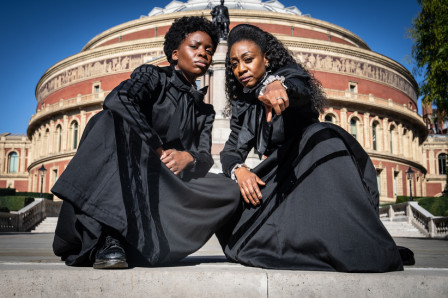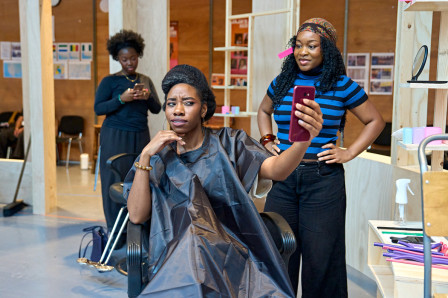Review: THE WINTER'S TALE at Shakespeare’s Globe
Another wonderful production has opened at the Globe continuing Michelle Terry’s first season of gender balanced productions. In the program, director Blanch McIntyre suggests that “we in the West seem to be experiencing a sort of emotional convulsion”, and this is certainly the story to reflect that disorder.
 Luke MacGregor (Florizel) and Norah Lopez-Holden (Perdita) in The Winter's Tale, Globe Theatre, 2018
Luke MacGregor (Florizel) and Norah Lopez-Holden (Perdita) in The Winter's Tale, Globe Theatre, 2018
A Winter’s Tale begins with Leontes, King of Sicilia, overwhelmed by suspicion that his innocent wife is having a love affair with his best friend Polixenes, the King of Bohemia, and is pregnant with his baby. Having convinced himself that the baby is not his, Leontes orders death of his newborn daughter, and in spite of his most faithful friends Paulina and her husband Antigonus pleading, Hermione is pronounced dead in prison, and the baby is abandoned on the coast of neighbouring Bohemia.
Discovered by kind shepherds who take care of her (and the gold that has been left by her side), Perdita grows up and sixteen years later meets and falls in love with Polixenes son, Prince Florizel. After some toing and froing with a shady comic rogue Autolycus, the pair elope to Sicilia where they are reunited with Perdita’s parents. The ever-loyal Paulina reveals a lifelike statue of Leontes ‘dead’ wife, Hermione who just happens to have survived his lapse of reason sixteen years earlier.
With a director and cast as consistently strong as this, it’s a production that pleases in spite of the dark first half. I’d recommend it heartily, but then I’d also recommend investing in the cushion as it’s over three hours long. Don’t let this deter you from buying a ticket: there are some astonishing performances. Will Keen made me chuckle as nervously as I’d anticipated, his Leontes reminiscent of Yul Brynner’s stroppy King of Siam, and not just because of the harem pants. His portrayal of foolish moral ugliness teetered dangerously on the verge of insanity.
Howard Ward and Annette Badland add depth and class while Jordan Metcalfe and Becci Gemmell add plenty of laughs, but it’s the central women who particularly delight, inhabiting Blanche McIntyre’s version of a modern society where women speak up for themselves as equals.
Take Hermione, often a portrayed as a withering wife who is sometimes suggested might have inadvertently ‘brought it on herself’. At no point does Priyanga Burford allow the idea that this woman is responsible for her husband’s raging breakdown, never losing dignity. Sirine Saba as the ever-loyal Paulina shines as Hermione’s best friend in a vocally potent, exciting performance.
In some ways the plot seems a timely reminder of how moral ugliness in the hands of a foolish chief making foolish decisions has the power to lead the people down unsatisfactory paths. A potential problem with this play is the discomfort of having to enjoy the comedy of the pastoral second half having just witnessed the abuse of women and children by masculine authority that goes unpunished. Again, timely? Luckily, Blanche McIntyre skilfully finds a way for Hermione, Paulina and Perdita to reach moral victory, leaving me surprisingly comfortable with the family reunion: I’ve previously not wanted Leontes to find a peace he surely doesn’t deserve.
Avoiding pointless showy directorial invention, Blanche McIntyre lets the text be the star without the need for high tech bells and whistles, delivered with delicious clarity. The costumes mix modern with flowing Eastern robes and the odd bit of traditional Elizabethan but the lack of specificity in design doesn’t seem to matter. If I had to criticise my only gripes would be a cheap printed ‘bear’ and that much as I love Will Keen’s climactic wonderment as he’s reunited with his wife and daughter, his contrition never seems to be truly suffered.
Latest News

 SYLVIA Releases First Single, 'March Women March'
4 March 2026 at 17:04
SYLVIA Releases First Single, 'March Women March'
4 March 2026 at 17:04

 Full cast and creative team announced for World Premiere of PLEASE PLEASE ME
4 March 2026 at 16:18
Full cast and creative team announced for World Premiere of PLEASE PLEASE ME
4 March 2026 at 16:18

 Rehearsal Images Released for JAJA'S AFRICAN HAIR BRAIDING at Lyric Hammersmith Theatre
4 March 2026 at 15:05
Rehearsal Images Released for JAJA'S AFRICAN HAIR BRAIDING at Lyric Hammersmith Theatre
4 March 2026 at 15:05

 STICK MAN returns to London for 15th run this festive season
4 March 2026 at 12:06
STICK MAN returns to London for 15th run this festive season
4 March 2026 at 12:06
